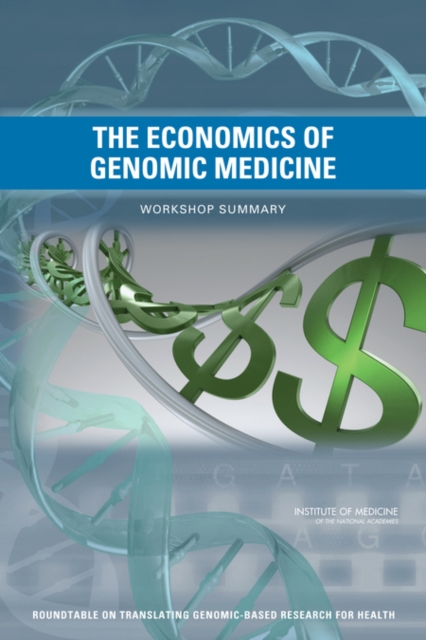
The Economics of Genomic Medicine : Workshop Summary Paperback / softback
by Institute of Medicine, Board on Health Sciences Policy, Roundtable on Translating Genomic-Based Research for Health
Edited by Steve Olson, Adam C. Berger
Paperback / softback
Description
The sequencing of the human genome and the identification of links between specific genetic variants and diseases have led to tremendous excitement over the potential of genomics to direct patient treatment toward more effective or less harmful interventions.
Still, the use of whole genome sequencing challenges the traditional model of medical care where a test is ordered only when there is a clear indication for its use and a path for downstream clinical action is known.
This has created a tension between experts who contend that using this information is premature and those who believe that having such information will empower health care providers and patients to make proactive decisions regarding lifestyle and treatment options. In addition, some stakeholders are concerned that genomic technologies will add costs to the health care system without providing commensurate benefits, and others think that health care costs could be reduced by identifying unnecessary or ineffective treatments.
Economic models are frequently used to anticipate the costs and benefits of new health care technologies, policies, and regulations.
Economic studies also have been used to examine much more specific issues, such as comparing the outcomes and cost effectiveness of two different drug treatments for the same condition.
These kinds of analyses offer more than just predictions of future health care costs.
They provide information that is valuable when implementing and using new technologies.
Unfortunately, however, these economic assessments are often limited by a lack of data on which to base the examination.
This particularly affects health economics, which includes many factors for which current methods are inadequate for assessing, such as personal utility, social utility, and patient preference. To understand better the health economic issues that may arise in the course of integrating genomic data into health care, the Roundtable on Translating Genomic-Based Research for Health hosted a workshop in Washington, DC, on July 17-18, 2012, that brought together economists, regulators, payers, biomedical researchers, patients, providers, and other stakeholders to discuss the many factors that may influence this implementation.
The workshop was one of a series that the roundtable has held on this topic, but it was the first focused specifically on economic issues.
The Economics of Genomic Medicine summarizes this workshop. Table of ContentsFront Matter1 Introduction and Overview2 Genomics, Population Health, and Technology3 The Intersection of Genomics and Health Economics4 Preconception Care and Sequencing5 Unprovoked Deep Vein Thrombosis6 Cancer Care7 Panelists' and Stakeholders' PerspectivesReferencesAppendix A: Workshop AgendaAppendix B: Speaker Biographical SketchesAppendix C: Statement of TaskAppendix D: Registered Attendees
Information
-
Available to Order - This title is available to order, with delivery expected within 2 weeks
- Format:Paperback / softback
- Pages:128 pages
- Publisher:National Academies Press
- Publication Date:20/07/2013
- Category:
- ISBN:9780309269681
Other Formats
- PDF from £2.84
- EPUB from £36.71
Information
-
Available to Order - This title is available to order, with delivery expected within 2 weeks
- Format:Paperback / softback
- Pages:128 pages
- Publisher:National Academies Press
- Publication Date:20/07/2013
- Category:
- ISBN:9780309269681






